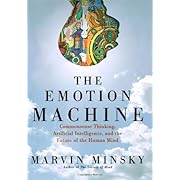
From my ACM Technews newsletter comes an announcement of Minsky's new book the Emotion Machine and a pointer to a recent interview. According to the interview article, the book provides a blueprint for a thinking machine that Minsky would like to build—an artificial intelligence that can reflect on itself. Here is an excerpt from the interview:
"What are your latest ideas about the mind, as set out in The Emotion Machine?
The theme of the book is that humans are uniquely resourceful because they have several ways to do everything. If you think about something, you might think about it in terms of language, or in logical terms, or in terms of diagrams, pictures, or structures. If one method doesn't work, you can quickly switch to another. That's why we're so good at dealing with so many situations."
The theme of the book is that humans are uniquely resourceful because they have several ways to do everything. If you think about something, you might think about it in terms of language, or in logical terms, or in terms of diagrams, pictures, or structures. If one method doesn't work, you can quickly switch to another. That's why we're so good at dealing with so many situations."
and on commonsense thinking:
"This is important because the way people solve problems is first by having an enormous amount of commonsense knowledge, like maybe 50 million little anecdotes or entries, and then having some unknown system for finding among those 50 million old stories the 5 or 10 that seem most relevant to the situation."
The book has mixed reviews on Amazon.com- but i am sure that since i am not a neuroscientist, i will find something interesting and thought provoking as i continue to work on information overload issues in the enterprise-because consumption of content is tied to our knowledge, understanding and current 'on demand' needs- so it is already in the mail.

No comments :
Post a Comment